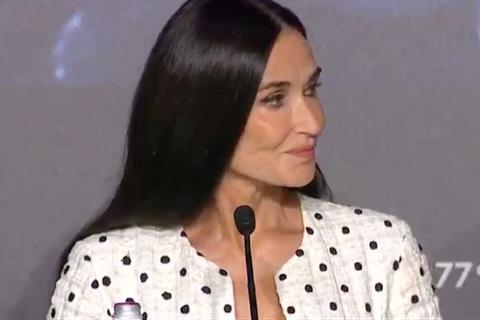Speaking at the Cannes Film Festival press conference for Competition title The Substance, Demi Moore described how making the film was a challenging, vulnerable experience that left her “with a greater acceptance of myself as I am”.

“There was something freeing about this exploration,” said Moore. “It was a very raw experience that required a depth of vulnerability and willingness to expose myself emotionally and physically that definitely pushed me out of my comfort zone.”
Coming through the filming process with that acceptance was “a gift”, she added.
French filmaker Coralie Fargeat’s feminist body horror follows an actress aged around 50 who make a faustian bargain to be young again, and is driven by two outstanding performances by Moore and Margaret Qualley as her new youthful incarnation.
Fargeat said her inspiration for The Substance came from entering her forties and feeling her place in society was in doubt.
“I had the feeling of, ‘Okay, now I’m going to disappear – it’s done’,” she explained. “When you reflect on this, you say, ‘What leads me to think like that?’ I’m an educated person, I’m a feminist, and [yet] still all those ideas have found a way to penetrate my brain.
“At all ages, women are kind of led to feel that we’re not right. When you’re younger, you feel like maybe you’re too fat or your ass is not the right way or your boobs are not big enough. Then when you get older, it’s like, oh, you have wrinkles. There is always something commented about your body.”
With women often hypersexualised in terms of representation and with the expectations placed upon them by society, it can lead “women to have an extreme violence towards ourselves. I don’t know any woman who doesn’t have an eating disorder. When you think about that, it’s just crazy.”
Fargeat described the MeToo movement as “the first little step” towards change.
“It’s 3,000 years of society organised in a certain way and it’s going to be hard to change. I’m really happy the movie is one little stone in the wall for that change.”
When asked at what age she felt “cancelled” as a Hollywood actress, Moore replied: “I don’t share that perspective of feeling cancelled. Regardless of what is going on outside of you, the real issue is how you are relating to the issue. My perspective is, I don’t [see] myself as a victim.
“What I loved in what Coralie wrote is that this was about the male perspective of the idealised woman that we have bought into,” she added. “In the film, this newer, younger, better version gets an opportunity and she still repeats the same pattern, she’s still seeking this external validation and in the end comes face to face with just fighting herself.”
“I don’t want to say that we’re anti-men [in the film],” Moore said later. “We’re just anti-jerks.”
Quaid, who plays a loathsome TV producer who brutally fires Moore’s fitness-show presenter Elizabeth Sparkle and hires Qualley’s Sue as her replacement, paid tribute to the late Ray Liotta, who was originally cast to play his role.
“In my heart I dedicated this role to him. He was an incredible actor.”

























No comments yet